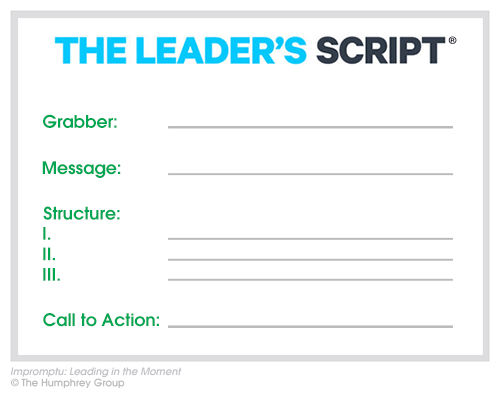 |
 |
01.04.18

You Unplugged: Prepare to be Spontaneous
M Judith Humphrey writes in Impromptu: Leading in the Moment, that “you must prepare to be spontaneous.” Because we don’t, it’s “not surprising that our daily conversations are often not geared to leadership and our encounters can be less than inspiring.” Interestingly, while the word impromptu is defined as “made or done without previous preparation,” it comes from the Latin in promptu that means “in readiness” or “prepared.” Not surprisingly, jazz musician and professor Stephen Asma wrote in a New York Times opinion piece, “The key to successful improvisation is getting your self out of the way. Usually, the ego tries to coordinate everything, but good improvisers dial down the ego and let the embodied system act, play and respond with reduced ego supervision.” He also states that “the ability to improvise is not just ‘winging it.’ It is built on foundations of study and practice that prepare the improviser for the moment of action.” When visitors lined the streets the night before his famous Gettysburg Address and asked Abraham Lincoln to say a few words, he responded by saying, “I appear before you, fellow-citizens, merely to thank you for this compliment. … I have no speech to make. In my position, it is somewhat important that I should not say any foolish things. The key to influential or leaderful impromptu communication is the right mindset. To be ready for that “moment of action” as Asma put it, Humphrey says the right mindset includes having the intention to lead, being a good listener, and being authentic, focused, and respectful.” To lay the groundwork for impromptu speaking, it is important that you know what you are talking about. You also need to keep your key leadership messages in mind. Your messages should support what you are about. “Whatever your organization, or team, or mission, write down your key message and supporting messages. Burn them in your mind, so you can draw upon them every time you speak. They will be the foundation of your many impromptu scripts.” Humphrey has developed a 4-part scripting template that can be adapted (expanded or contracted) to fit any situation. It is helpful for organizing your thoughts.  First, is the Grabber. This bridge to your audience can be a friendly greeting, reference to a previous discussion, or a segue from someone’s point. Your grabber should not only engage your audience, but it should also bridge to your message. Second, is your Message. This is your point. It is the heart of your impromptu script. It is one idea, engaging, and positive. Third, is the Structure. Create a compelling case for your message with clear, persuasive arguments. Fourth, is the Call to Action. Show how your message can be acted upon. It can be a handoff, or request a decision, give concrete steps, encourage, convey an ultimatum, or inspire collaboration. It motivates. Humphrey’s provides examples of how this can be used in various situations including how it can be expanded and contracted depending on the situation and timing constraints. Malcolm Gladwell explains in Blink that “Improve isn’t random and chaotic at all. It is an art form governed by a series of rules, and [actors] want to make sure that when they’re up onstage, everyone abides by those rules.” “Impromptu speaking,” explains Humphrey’s, “requires the same discipline that the best improvisational actors and jazz musicians use. It, too, is built on a set of rules as well as practice.” Be prepared to lead in any impromptu moment. 
Posted by Michael McKinney at 03:35 PM
|
BUILD YOUR KNOWLEDGE
 

How to Do Your Start-Up Right STRAIGHT TALK FOR START-UPS 
Grow Your Leadership Skills NEW AND UPCOMING LEADERSHIP BOOKS 
Leadership Minute BITE-SIZE CONCEPTS YOU CAN CHEW ON 
Classic Leadership Books BOOKS TO READ BEFORE YOU LEAD |